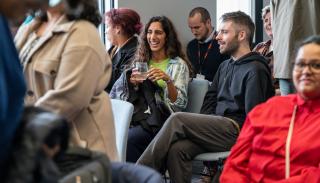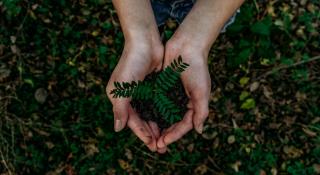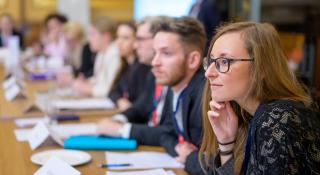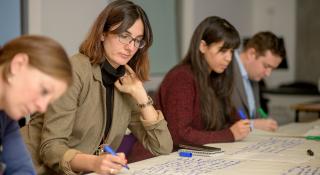
Breadcrumbs navigation
Student voices – Moving abroad and the highs and lows of PhD life
In the second of a series of interviews and blogs from PhD students, we look at different students’ experience of moving to the UK, the best and most challenging things about PhD study, and how being a part of BISA has been beneficial to them.
Contributors
- Sabrina Ahmed - University of East Anglia
- Christopher Choong Weng Wai – University of Warwick
- Ndidi Olibamoyo - University of Bath
- Shivani Singh - Aberystwyth University
- Chester Yacub - University of Nottingham
How have you found the experience of moving to the UK to study?
Christopher: I moved to the UK with my wife and child. There are many things to say about doing a PhD and bringing your family abroad, but if I were to share one distinct experience, it would be about resolving/negotiating care arrangements in the UK when I was planning to go back to Malaysia for a couple of months (for my PhD fieldwork). Should my family stay behind or come along? How long should I go back for? Should I coincide/overlap the trip with school holidays? Without dwelling too much in the specifics, the episode reminds me of Brooke Ackerly and Jacqui True’s point about how these personal questions, which may not seem to be questions about research at first, do in fact shape our research methodology—for me, certainly, the duration, timing, and design of the fieldwork. There are many instances like this where I find family life and PhD life entangled, showing me how the personal/political is equally embodied in a PhD journey.
Shivani: The experience of moving to the UK has been very fruitful and has taught me a lot. Before moving here, I had never lived alone. My experience here has instilled in me valuable life lessons, most important one being independence and hard work. It has helped me develop a well-rounded personality and inculcated in me the kind of confidence that I wouldn’t trade for anything.
Ndidi: It has been a mixed experience. I came to the UK as the mum of a young child and a very supportive spouse. I already had family ties in the UK, and this was really helpful for me and my family as we came to the UK when it was locked down due to COVID-19 restrictions. Since schools were shut down and operated remotely, my family provided me with the soft-landing and orientation we needed to settle into the UK. In the times before my child was old enough to start formal education, my family helped me with babysitting and also supported with funds as we tried meeting financial demands for my tuition. Without the support of my husband and extended family, I would have struggled with meeting up with my yearly fee schedule, research demands and deadlines. Having my child witness my experiences as a doctoral researcher provides me with inspiration whenever the research gets overwhelming. I am able to model tenacity and grit to her for her own life journey.
Sabrina: Moving to the UK in 2021 during the Covid restrictions was indeed an extraordinary experience. I re-entered academia with a great deal of enthusiasm as I was a little frustrated with the bureaucracy and a conflict of ethics in my professional career. Initially, leaving my parents behind seemed like a decision I could reconcile with, albeit reluctantly. However, as the year 2024 commenced, everything began to unravel, making me think that I made a poor decision. And now in light of the unbridled state of global politics and the ongoing crisis in Gaza, I find myself overwhelmed with a compelling urge to return to humanitarian work. I see students are stressed about their PhD, about a book they could not find, an article they did not understand, a meeting that did not go well and a due publication. I envy them. I hope those were the only taxing issues in my life too.
My PhD journey started with a lot of learning and expectations. I was required to take two mandatory courses in the first year of my PhD and before I knew it, the year flew by with all the learning, assessments, and probationary reviews for my thesis. Then, in my second year, I accomplished eight-month-long fieldwork in Bangladesh. It was quite intense, working full-time with a UN organization to access the camps besides my fieldwork. Despite the stress, I must say that it was incredibly meaningful where I got to reconnect with former colleagues and engage with the refugee community in the camps.
Apart from my fieldwork, my role at the UN involved assessing and compiling reports on violence, crime, and homicides within the district and specifically within the camps. In addition to documenting daily numbers of injuries and unnatural deaths, part of my responsibilities included assessing graphic images depicting instances of violence and homicides. This, along with talking to the refugees placed me under constant stress as I wrestled with the daily realities, distress, and trauma experienced by Rohingya refugees residing in the camps.
Due to the nature of my research topic around security in the camps, I had to listen to their everyday stories of security and insecurity that were rather grim. At a certain point, the conditions within the camp deteriorated to such an extent that the occurrence of at least 2-3 homicides per week challenged the continuation of my fieldwork. Nevertheless, I was able to endure with the support of my refugee friends and colleagues from the humanitarian field.
Having completed my fieldwork, I have returned to Norwich. As an individual who appreciates nature, I find Norwich to be an exceptionally beautiful city, fill with abundant greenery, parks, marshlands, and small forests. Despite my limited time to spend here, I must express my deep affection for this city. I already find myself experiencing separation anxiety from Norwich.
Chester: Moving to the UK to pursue my PhD has been a rewarding and enriching experience overall. Having already undergone the transition during my master’s studies, I found the adjustment period to be smoother this time around. One significant aspect that eased the transition was my familiarity with the British academic system, for instance, in terms of writing argumentative essays. This familiarity allowed me to hit the ground running and delve deeper into my research from the outset.
As for the experience of relocating with family, while I did not bring family members with me during my PhD studies, I can attest to the challenges and rewards of such a decision based on conversations with peers and colleagues who have undertaken similar journeys. For those who did bring their families, navigating the logistical and emotional aspects of relocation undoubtedly presented its own set of challenges. However, many found that the supportive community within their academic institutions, coupled with the diverse cultural landscape of the UK, contributed to a positive overall experience for themselves and their families.
In summary, my experience of moving to the UK to study for my PhD has been marked by a sense of familiarity and growth, underpinned by my prior exposure to the British academic system. While each individual’s experience may vary, mine has been characterised by a smooth transition and a deepening engagement with academic scholarship.
Without the support of my husband and extended family, I would have struggled with meeting up with my yearly fee schedule, research demands and deadlines. Having my child witness my experiences as a doctoral researcher provides me with inspiration whenever the research gets overwhelming. I am able to model tenacity and grit to her for her own life journey.

What have been some of the biggest challenges in doing a PhD?
Sabrina: I think for me the biggest challenge is to act normal and continue what I started. I do not attribute this struggle to my PhD or any aspect of my research journey; rather, it is the current circumstances that seem to be working against me, I suppose.
Christopher: I think it is (not) knowing when research starts and ends. Sometimes, a thought, question, or unsolved problem would “linger” in your head. But the solution is less about drawing a physical separation between “work” and “life” per se, since “life” with all its contradictions would always prompt one to go back to our questions, assumptions, concepts, arguments, narratives, and all that. It is really about the ability to mentally detach ourselves from the specificities of the research, and allow our minds to rest. I find that to be a challenge, but perhaps doing something that requires more intense concentration, like cooking a complicated dish, helps (at times).
Shivani: The biggest challenge has been dealing with the loneliness that comes with pursuing a degree such as PhD. Oftentimes, PhD can be an all-consuming pursuit, but with the right friends and understanding supervisors this is a challenge that can be overcome.
Ndidi: The biggest challenge for me in doing a PhD has been funding while studying full time. Another has been learning to do research within the Social Sciences with an academic background in the Humanities. I have had to learn social science research skills. This took a longer time than envisaged and it impacted on my doctoral studies timelines. As a result, where I ought to be reaching certain milestones like first year confirmation exams, I was slower as I was still navigating understanding social science research methods and its application to my research. Finally, there are instances where the UK media is replete with anti-immigrant rhetoric and negative opinions about the presence of international students in the UK. Managing this while studying have been difficult.
What is one thing you really enjoy about your PhD or studying/living in the UK?
Chester: One aspect of pursuing my PhD in the UK that I genuinely relish is the freedom to explore my research interests fully. From the outset, my supervisor encouraged me to pursue my chosen topic, providing unwavering support and guidance along the way. This level of autonomy has allowed me to delve deeply into areas that truly inspire and motivate me, resulting in a research journey that feels deeply personal and fulfilling.
Sabrina: I am kind of an anti-social individual without any kind of outgoing skills. So I would say I enjoy doing my research and reading books and articles in the library and my office. Exploring the critical security literature has truly widened my perspective, and I continue to garner new insights. This endeavour not only aids in my academic growth but also contributes to my personal development to evolve as a more compassionate and insightful individual.
The biggest joy of living in Norwich is going for a walk in the park, in the forest, next to the river whenever I want to, a luxury not readily available in my home country. Here, I wish I knew how to bike, this is something I am considering learning in the coming months if the circumstances allow.
Christopher: Well, some people tell me that doing a PhD can be a lonely journey, but I personally enjoy the solitude and quiet space that it affords me—to read, think, and write (which is a privilege in many ways, but a privilege I remind myself to use for emancipatory agendas). I also enjoy the vibrant, critical, and plural intellectual environment I am in, at least amongst the communities that I am a part of, and find solidarities beyond academia (and sometimes on the streets) energising. Finally, I supposed there is something nice about being away in a less familiar place, and having the opportunity to be curious, or be surprised by new “foreign” encounters.
Ndidi: One thing I enjoy about studying in the UK is experiencing minimal interruptions to my education as a result of industrial actions by Academic Union. In my home country where industrial actions can last for over a year, the kind experienced in the UK does not extend beyond days. Another positive experience is access to relevant journal articles or academic sources that are behind paywalls. As a student of a UK institution, through institutional subscriptions to multiple publishers, I can access several resources without limitations. Finally, the supervisory process emphasises independent while conducting your research and this allows you to own the research without any imposition.
Shivani: The best part of doing a PhD is meeting new people and getting to know more about their exceptionally interesting and ambitious research projects. Building and being part of a close-knit community of scholars and early-career researchers has been one of my biggest achievements.
This level of autonomy has allowed me to delve deeply into areas that truly inspire and motivate me, resulting in a research journey that feels deeply personal and fulfilling.

Has being part of BISA and its working groups been beneficial to you as a PhD student?
Chester: Being actively involved in BISA working groups and the Postgraduate Network (PGN) has benefited my doctoral journey immensely. These platforms allowed me to share my research, receive constructive feedback, and present at BISA annual conferences, expanding my academic reach beyond my immediate circle.
My affiliation with the BISA PGN began early in my PhD tenure, engaging in monthly mini-conferences and benefiting from diverse talks and workshops. Sessions covering conference application strategies, presentation skills, writing techniques, and teaching approaches proved invaluable. Additionally, serving on the BISA PGN Committee, first as Events Officer and Communications Officer further deepened my engagement and commitment to the community.
These BISA networks not only provided practical tools but also fostered a sense of camaraderie and shared experiences among academic scholars, and especially fellow PhD students. Knowing that others were facing similar challenges and learning coping strategies helped alleviate the stress associated with academic work. Being part of these communities provided a supportive environment that boosted my confidence and resilience throughout my PhD journey.
Christopher: I am now connected to the Colonial, Postcolonial and Decolonial (CPD) working group, after I joined the CPD's second annual Early-Career Researcher Paper Prize in 2022/23. Although I am not as active as I would like, I find the CPD working group to be a very generative space, exposing me to the (brilliant) works of other colleagues researching similar areas (and asking thought-provoking questions), and there is constant sharing of resources, events, call for papers, etc.
Ndidi: Being a part of BISA and its working groups has been beneficial to me in several ways. First, it provides me with the platform to share my research progress and get insights from more senior scholars in order to enrich my research. This happens within the context of BISA Annual Conference and other working group events targeted at encouraging PhDs and ECRs. Second, as a member of the PGN Committee, I have had the opportunity to improve my leadership skills and ability to work with a team to achieve its visions. I have also had the opportunity to work with senior scholars as they seek to advance the frontiers of International Studies within and outside the UK. Third, through BISA, I have forged friendships that have been useful for my research and academic trajectory.
Shivani: Being part of BISA as a Vice-Chair of the PGN committee in 2021-22 and as PGN Chair in 2022-23 proved to be a wonderful opportunity for my personal and professional development. It allowed me to be part of a bigger community of researchers and scholars with similar research interests. BISA PGN committee helped in facilitating numerous workshops on professional development and helped me get connected to my peers and seniors from whom I received useful advice on tangible skills such as teaching and writing which are extremely crucial in PhD and post-PhD careers. Moreover, through the PGN committee, I discovered my untapped potential, being in a position of leadership. It helped me get out of my comfort zone and assume newer responsibilities.
Is there anything else you’d people to know about your PhD journey or doing a PhD in general?
Sabrina: I sometimes tell my friends that we should rethink how we do PhDs and we must decolonise our PhD attitude. It is frustrating to see some PhD students, without any real-life work experience, are permeated with the notion that pursuing a doctorate degree makes us something extraordinary. I respectfully disagree with them. Intellectually, PhD is indeed an extraordinary journey but it does not equate to the world's end. Personally, I, too, grapple with the challenges of research daily; there are moments when writing even a single sentence feels like scaling a mountain. But while we are wrapped up in our academic world, it is important to remember what is going on outside it. I see few individuals studying critical theories and international relations still disagree that a genocide against the Palestinian population is going on. Their efforts to maintain neutrality in this matter are particularly distressing to me. How can anyone remain neutral when witnessing the events unfolding in Gaza? I believe that our PhD journeys should cultivate humility and empathy while making us more honest, sensible and aware of the real world, not just lost in our academic bubble.


